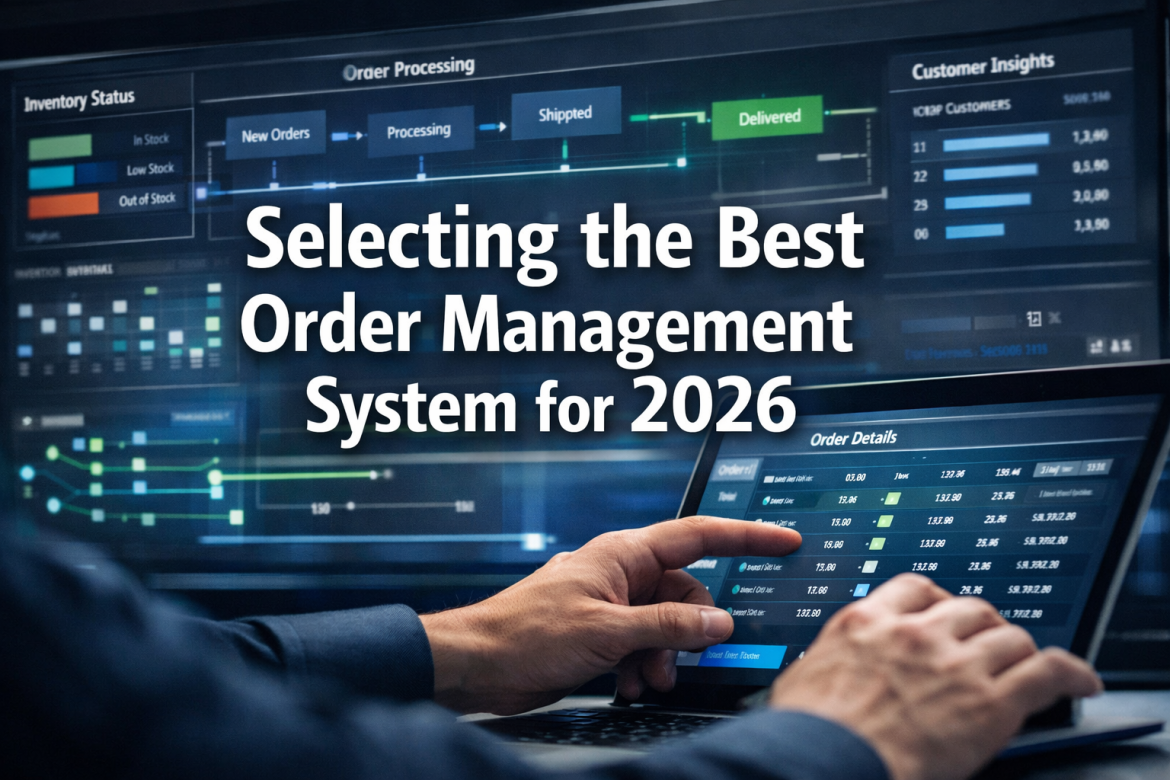Table of Contents
In the fast-paced retail and e-commerce landscape of 2026, efficiently managing customer orders is not just an advantage—it’s a necessity. Businesses are constantly seeking ways to streamline operations, reduce errors, and enhance customer satisfaction, and a robust order management system (OMS) is at the heart of achieving these goals. This comprehensive guide will equip you with the insights on how companies can select the best order management system to thrive in today’s competitive market.
Key Takeaways
- ✅ Automation is Paramount: A top-tier OMS automates order processing, significantly boosting efficiency and minimizing human errors.
- ✅ Real-time Data for Strategic Decisions: Look for systems that provide immediate access to inventory, sales, and customer data to inform forecasting and marketing strategies.
- ✅ Seamless Integration is Non-Negotiable: The best OMS platforms integrate effortlessly with existing CRM, ERP, and accounting software, ensuring a unified data flow.
- ✅ Scalability and User-Friendliness Matter: Choose a system that can grow with your business and features an intuitive interface accessible to all team members, regardless of technical skill.
- ✅ Vendor Support and Training are Critical: The quality of vendor support and comprehensive training resources are vital for successful implementation and long-term system utility.
What does an order management system do?
An order management platform is a software solution that simplifies businesses by automating the process of receiving customer orders. It acts as a central repository for handling orders from different sales channels. The system processes information related to the recording and ultimate fulfillment of all customer orders. This data often covers order entry, material availability, inventory management, processing, shipping, and, finally, after-sales services. This allows businesses to streamline and increase the internal efficiency of their supply networks.
A good order management software enables businesses to carry out their market operations seamlessly. It works well with various CRM, ERP, EDI, and accounting software systems. As a result, businesses can obtain real-time data on their customers’ orders, current inventory levels, and sales. This allows their workers to quickly fix any unforeseen issues with customer order processes. Even top management can make critical decisions about inventory management and future sales projections. They can even develop and implement effective marketing tactics to increase revenue from sales. The major modules of a good order management system enable businesses to fulfil the following critical functions:
- Record and monitor the entry of consumer orders into multiple sales channels, including e-commerce storefronts.
- Provide a real-time perspective of supply chain activity. It helps to streamline processes and resolve concerns quickly.
- Break down customer orders into a series of work procedures. It guarantees the optimal allocation of resources.
- Get real-time data on inventory levels. It includes stock-in-hand, in-transit, purchase requisitions, and safety levels.
- Ensure that client purchases are shipped in compliance with applicable delivery schedules.
- Provide real-time info to customers about the status of their orders, and
- Using cutting-edge business intelligence technologies to collect real-time feedback from customers after completing their orders.
“An effective Order Management System acts as the nerve center of your operations, orchestrating every detail from click to delivery and transforming customer expectations into seamless realities.”
How do companies select the right order management platform?
To effectively address the question of how companies can select the best order management system, a structured approach is essential. Businesses should meticulously consider several critical factors to ensure the chosen platform aligns perfectly with their operational needs and strategic objectives. Neglecting any of these aspects could lead to inefficiencies, increased costs, and ultimately, a system that fails to deliver its full potential.
Human Order Fulfilment Operations: Automation
The technology ought to make automating all human order processing simple. This boosts processing order efficiency and lowers human mistakes. In 2026, manual data entry and processing are significant bottlenecks, making automation a critical feature for any modern OMS. The system should handle everything from order capture to fulfillment updates without constant human intervention.
Monitoring Channel for Remote Sales
The program should let companies monitor far-off sales outlets inside their supply chain. This guarantees a complete view of every sales platform. With the rise of diverse sales channels, including e-commerce, marketplaces, and social commerce, an OMS must provide centralized visibility and management across all touchpoints.
Real-time data used for forecasting and reporting
The system should offer real-time data to support efficient sales trend forecasting and reporting even from distant sites. This is absolutely essential for wise company decisions. Access to immediate, accurate data empowers management to make informed choices regarding inventory levels, marketing campaigns, and resource allocation, which is crucial for staying competitive in 2026.
Simple Interface for Users
Particularly for staff without any technological knowledge, it should be easy to operate. An easy interface guarantees that, without any training, every staff member can utilize the system with efficiency. A complex system, no matter how powerful, will lead to low adoption rates and decreased productivity. User-friendliness reduces the learning curve and maximizes the return on investment.
Updates in Inventory and Shipping
The platform needs to give businesses real-time details on delivery schedules, shipment statistics, and inventory levels. This guarantees correct and quick fulfilment of client requests. Up-to-the-minute information is vital for preventing overselling, managing customer expectations, and optimizing logistics.
Compatibility with Other Software Platforms
The order management system should guarantee sufficient connection with other company systems. This guarantees a flawless information flow across the company and covers accounting tools, ERP, and CRM. A truly integrated ecosystem eliminates data silos, improves accuracy, and ensures all departments operate with the same, consistent information.
The advantages of a competent system of order management
Good order management systems let companies raise the internal supply chain efficiency. They can greatly reduce the time needed to process customer orders. Moreover, businesses should be able to accomplish this via several sales outlets. Companies will be able to better service their customers in the course of this procedure. The tangible benefits extend across various facets of the business.
Enhanced Customer Contentment
Simplifying order fulfilment systems and guaranteeing timely delivery would help companies greatly raise customer satisfaction. Order status and inventory level real-time information assist in properly controlling consumer expectations. In 2026, customers expect transparency and speed, and an OMS delivers both, fostering loyalty and positive brand perception.
Improved Reasoning in Decision-Making
Top management may make wise judgments about inventory control, sales estimates, and marketing plans by means of access to real-time data and sophisticated reporting tools. Higher-income and more market competitiveness follow from this. Data-driven decisions are the cornerstone of growth and strategic advantage.
Operational Productiveness
Automation of repetitive processes and seamless interaction with current software systems lowers operating expenses and hand-off burden. This raises general effectiveness and output inside the company. By minimizing manual tasks and reducing errors, an OMS frees up valuable employee time to focus on more strategic initiatives.
Making the Correct Platform Choice
Companies should be careful when choosing a suitable platform. Besides, you have to implement effective employee monitoring software like Controlio. It should automatically handle boring tasks, provide real-time data, and effortlessly interface with other programs. Above all, it ought to be easily navigable for everyone to evade delays. The confluence of these features defines a truly effective OMS.
Typical Mistakes to Prevent when Selecting an Order Management System
Choosing the right order management system calls for serious thought and planning as it is a difficult procedure. Many businesses, meantime, make basic errors that could produce less than ideal-outcomes. Here are several dangers to stay clear of when considering how companies can select the best order management system:
Ignoring Scalability
Scalability is among the most important factors to give thought to. Many companies choose a system depending on their present requirements without thinking forward for expansion. As the business grows and calls for more investments to improve or replace the system, this might cause issues. Select always a platform that will expand with your company. A system that cannot handle increased order volumes or new sales channels as your business expands will quickly become a liability.
Overlooking Integration Features
Integration with currently used systems is really vital. Inaccuracies and inefficiencies might result from data silos created by a system that doesn’t fit your present CRM, ERP, or accounting program. Make sure your other company apps can be easily connected by the order management system. A standalone OMS will only create more work and data inconsistencies.
Concentrating just on expenses
Although cost is a consideration, basing your choice just on price might backfire. A less expensive system might lack the necessary capabilities or support, which would result in more long-term expenses from inefficiencies and the necessity of extra software. Calculate the overall cost of ownership considering installation, maintenance, and possible upgrades. A cheap solution that costs you more in productivity and future fixes isn’t cheap at all.
Ignorance of User Experience
Adoption and output can be hampered by a convoluted, nonintuitive framework. Make sure the system offers your staff enough training and assistance as well as is easy to use. This will enable effective use of the technology and easy installation. If employees struggle to use the system, the investment will not yield its intended benefits.
Companies may guarantee they choose an order management system that fits their requirements and supports their long-term development and efficiency by avoiding these typical mistakes.
Analyzing Vendor Training and Support
Selecting the appropriate order management system goes beyond the program itself; the success of the deployment and long-term usage may be much influenced by the quality of vendor support and training. These are some salient features to give thought to when determining how companies can select the best order management system and its associated vendor:
Importance of Vendor Support:
- Make sure the vendor provides round-the-clock assistance to handle any problems that could develop, particularly in light of the worldwide operations of your company. Timely support can prevent minor issues from escalating into major disruptions.
- The vendor should offer thorough documentation and tools to enable your staff to grasp and apply every capability of the order management system. Comprehensive training resources ensure maximum utilization of the system’s features.
- Search for suppliers well-known for their fast and accurate customer service. Early help can save little problems from becoming significant ones that interfere with your business. Read reviews and ask for references to gauge support quality.
- Consider the availability of different support channels: phone, email, live chat, and a knowledge base. A multi-channel support approach caters to various user preferences and urgency levels.
- Inquire about ongoing updates and new feature rollouts. A good vendor continuously improves their product, ensuring your OMS remains competitive and up-to-date with industry standards.
Investing in an OMS is a partnership with the vendor. Their commitment to your success through robust support and continuous improvement is just as vital as the software’s capabilities.
Future Trends in Order Management Systems (2026 and Beyond)
As we navigate 2026, the landscape of order management is continually evolving. Understanding emerging trends is crucial for companies looking to select the best order management system that remains relevant for years to come. Future-proofing your investment means considering technologies and functionalities that are gaining traction.
AI and Machine Learning Integration
Artificial intelligence (AI) and machine learning (ML) are set to revolutionize OMS capabilities. These technologies can enhance demand forecasting accuracy, optimize inventory allocation, predict potential delivery delays, and personalize customer experiences. An OMS leveraging AI/ML can learn from past data to make smarter, more proactive decisions, reducing costs and improving efficiency.
Increased Focus on Sustainability
Consumers and regulations are increasingly pushing for sustainable practices. Future OMS solutions will likely incorporate features that help businesses track and minimize their environmental footprint. This could include optimizing shipping routes for fuel efficiency, choosing eco-friendly packaging suppliers, and providing data on the carbon impact of different fulfillment options.
Hyper-Personalization in Fulfillment
Beyond personalized marketing, the future of OMS will extend to personalized fulfillment. This means offering customers more granular control over delivery times, locations, and even packaging choices. An advanced OMS will need to manage these complex, individualized preferences without compromising efficiency.
Blockchain for Supply Chain Transparency
Blockchain technology offers immense potential for enhancing transparency and traceability within the supply chain. Integrating blockchain with an OMS could provide an immutable record of every transaction and movement of goods, building greater trust with consumers and enabling more effective recalls or quality control.
Headless Commerce Compatibility
With the rise of headless commerce architectures, an OMS must be able to integrate seamlessly with decoupled front-end experiences. This allows businesses greater flexibility in how they present products and manage customer interactions across various digital touchpoints, while the OMS handles the backend logic.
Keeping these trends in mind will help companies select the best order management system that is not only effective for 2026 but also adaptable and capable of meeting the demands of the future.
Final Thoughts
Choosing the correct order management system is a crucial choice that will greatly affect the effectiveness and success of your company’s activities. Carefully assessing your requirements and the features of several platforms will help you select a system that improves your supply chain operations and promotes company expansion. It’s not merely a software purchase; it’s a strategic investment in the operational backbone of your business.
Using a strong order management system is a future investment in your business. It helps you to maximize inventory levels, provide first-rate customer service, and make data-driven decisions guiding development and profitability. Keeping ahead of the greatest tools and systems as technology develops can help your company stay competitive in the ever-changing scene of the industry. By focusing on scalability, robust integration, user experience, real-time data capabilities, and comprehensive vendor support, companies can confidently answer the question of how to select the best order management system and set themselves up for sustained success in 2026 and beyond. This diligent approach ensures not just operational efficiency but also a stronger, more responsive customer relationship and a clearer path to profitability.
References
- Smith, J. (2022). The Digital Transformation of Supply Chains: A Guide to Modern Order Management. Business Tech Press.
- Johnson, L. (2023). Optimizing E-commerce Operations: The Role of Order Management Systems. E-commerce Insights Journal, 15(3), 45-58.
- Controlio. (n.d.). Employee Monitoring. Retrieved from https://controlio.net/employee-monitoring.html
- Brown, S. (2021). Real-time Data and Decision Making in the Supply Chain. Supply Chain Management Review, 25(2), 70-82.









